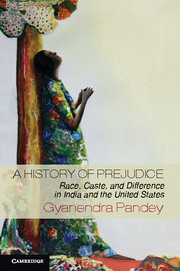7 - The Persistence of Prejudice
Published online by Cambridge University Press: 05 February 2013
Summary
What I have attempted to do in this book is to explore some of the circumstances and ways in which the matter of prejudice – “vernacular” and “universal” – has shaped the history of African Americans and Dalits, and by extension the history of the United States and India, over the last century and more. It should be obvious that many of the quandaries and challenges considered here do not apply to these minorities alone, although it will be clear, too, that prejudice and its costs affect different populations, and differently disenfranchised and marginalized groups, in many distinct ways. The proposition is perhaps self-evident. However, its force and its fallout, not always adequately appreciated, may be illustrated simply.
“Hindustan mein rehna hai, to humse milkar rehna hoga/ Hindustan mein rehna hai, to bande mataram kehna hoga,” as Hindu right-wing political forces have it, in a slogan that has appeared over and over again in attacks against the Muslim minority in India, in the mouths of political agitators, and on city walls, especially since the 1980s. “Those who wish to live in Hindustan will have to live like us/ Those who wish to live in Hindustan will have to say ‘Bande Mataram’ [Victory to the Mother; i.e., the mother goddess, who is also Mother India].” In an echo of the “Jewish question” of the nineteenth and twentieth centuries, Muslims can live in India, as long as they stop being Muslims. Samuel Huntington articulates much the same kind of proposition for immigrants from Mexico who have come to live, work, and die in the United States (in quite significant numbers even in military service, to which the American establishment readily welcomes them). “There is no Americano dream,” he writes. “There is only the American dream created by an Anglo-Protestant society. Mexican-Americans will share in that dream and in that society only if they dream in English.” Here, the suggestion goes, as in the case of Jews ceasing to be Jews, or Muslims Muslims, is another impossibility.
- Type
- Chapter
- Information
- A History of PrejudiceRace, Caste, and Difference in India and the United States, pp. 194 - 220Publisher: Cambridge University PressPrint publication year: 2013

